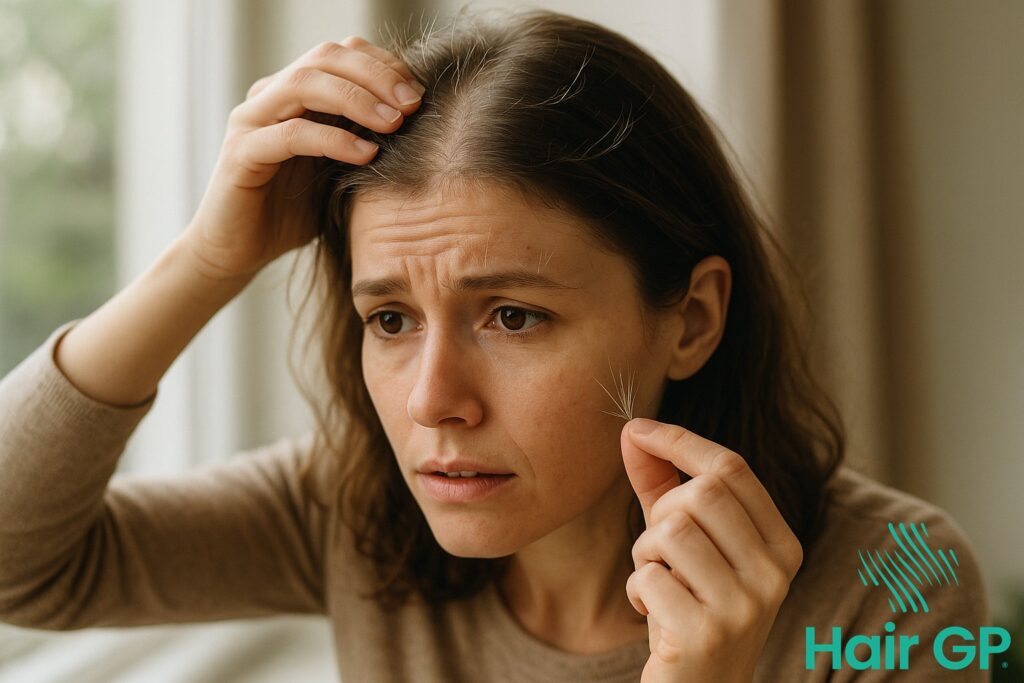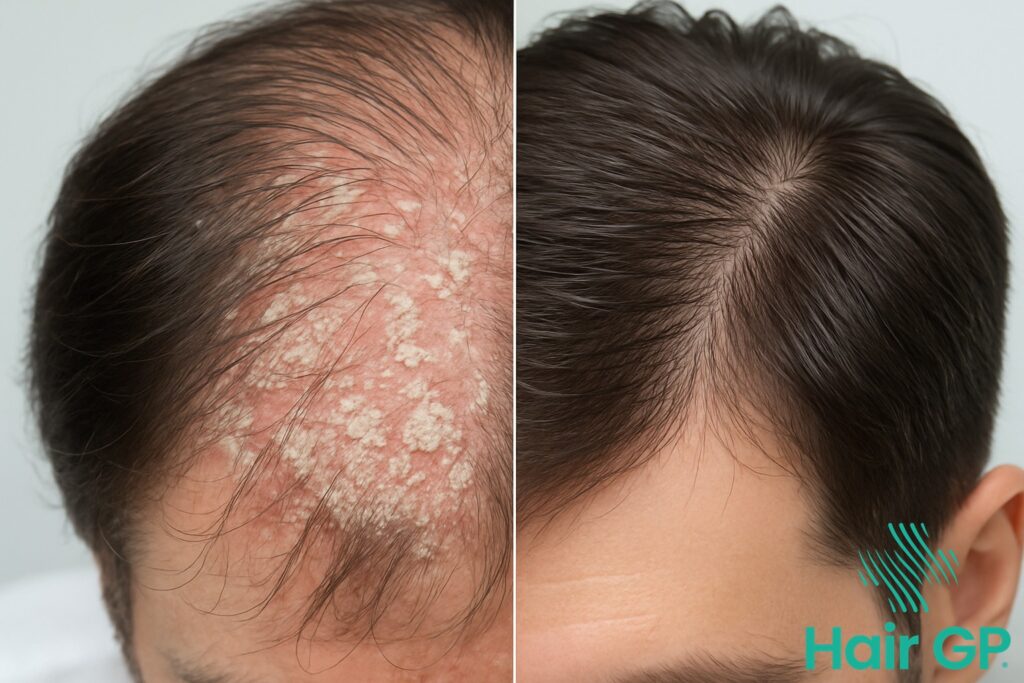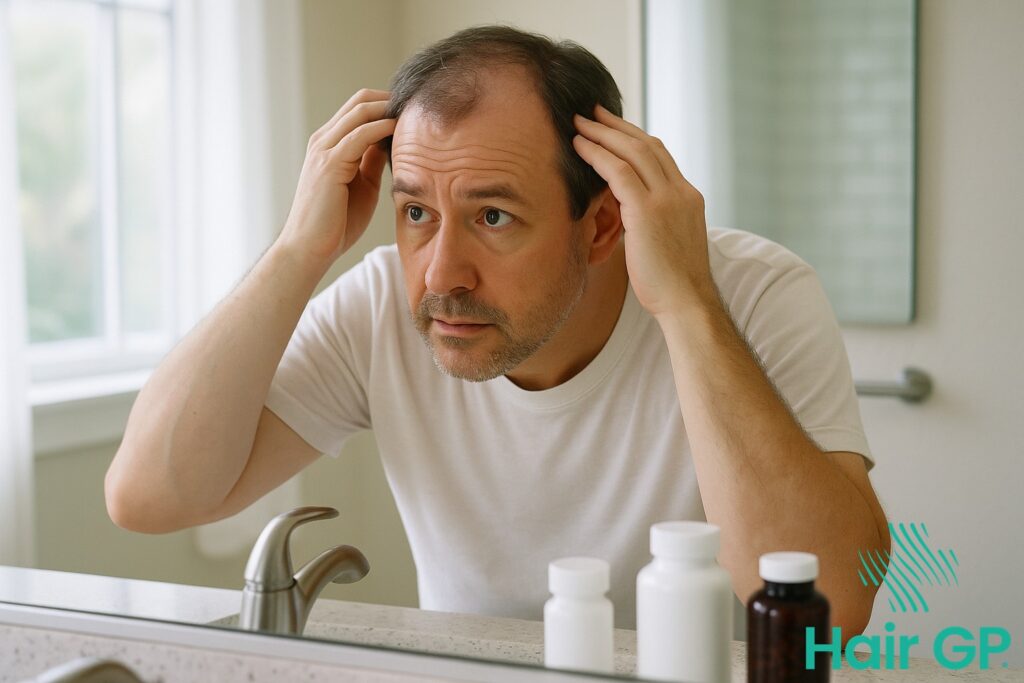Introduction
Experiencing hair loss weeks after recovering from food poisoning can be alarming and unexpected. Whilst most people associate food poisoning with immediate gastrointestinal symptoms, few realise that this acute illness can trigger significant hair shedding months later. This delayed reaction, known as telogen effluvium, occurs when severe stress from the illness disrupts the normal growth cycle of hair follicles.
Food poisoning places extraordinary stress on the body, depleting vital nutrients and triggering inflammatory responses that can push actively growing hairs into a premature resting phase. Typically appearing two to three months after the initial illness, this type of hair loss affects the entire scalp rather than creating patchy bald spots. Understanding this connection can provide reassurance during what might otherwise be a frightening experience.
This article explores the biological mechanisms linking acute stress from food poisoning to subsequent hair shedding, examining how the body’s response to severe illness affects follicular health. We’ll investigate the typical timeline and symptoms you might experience, helping you distinguish this temporary condition from other forms of hair loss. Additionally, we’ll address how gastrointestinal distress can create nutritional deficiencies that compound the problem, particularly affecting iron and protein levels crucial for healthy hair growth. Finally, we’ll provide evidence-based strategies to support recovery and encourage healthy regrowth, including nutritional restoration approaches and gentle care practices that can help your hair return to its normal growth cycle more quickly.
Key Takeaways – TL/DR
- Food poisoning can trigger telogen effluvium, causing hair loss 2-3 months after the illness
- Severe dehydration and nutritional deficiencies from food poisoning stress hair follicles
- Most cases of post-food poisoning hair loss are temporary, with regrowth occurring within 6-9 months
- Proper nutrition and stress management are crucial for supporting hair recovery
Understanding the Connection Between Food Poisoning and Hair Loss
The connection between food poisoning and hair loss lies in the body’s response to severe physiological stress. When the digestive system endures an acute gastrointestinal illness, it triggers a cascade of biological reactions that can profoundly affect hair follicles throughout the scalp. This phenomenon represents a classic example of how systemic stress manifests in unexpected ways long after the initial insult has resolved.
During severe food poisoning, the body enters a state of crisis management, redirecting resources away from non-essential functions like hair growth. This intense physiological stress pushes a significant portion of actively growing hair follicles prematurely into the telogen phase, the resting stage of the hair growth cycle. Research indicates that telogen effluvium can affect up to 30% of scalp hair follicles, compared to the normal 5-10% typically in the resting phase [1].
What makes this condition particularly distressing is the delayed onset of hair shedding. The timeline between the stressful event and noticeable hair loss typically spans two to three months [2]. This delay occurs because affected hairs remain anchored in their follicles during the telogen phase before eventually being shed. Consequently, individuals often struggle to connect their current hair loss with the food poisoning episode they experienced weeks earlier.
The severity of the illness plays a crucial role in determining the extent of hair shedding. More intense episodes of food poisoning, particularly those involving prolonged vomiting, severe dehydration, or hospitalisation, create greater metabolic stress on the body. This heightened stress response increases the likelihood and severity of subsequent telogen effluvium, making the connection between the acute illness and later hair loss more pronounced.
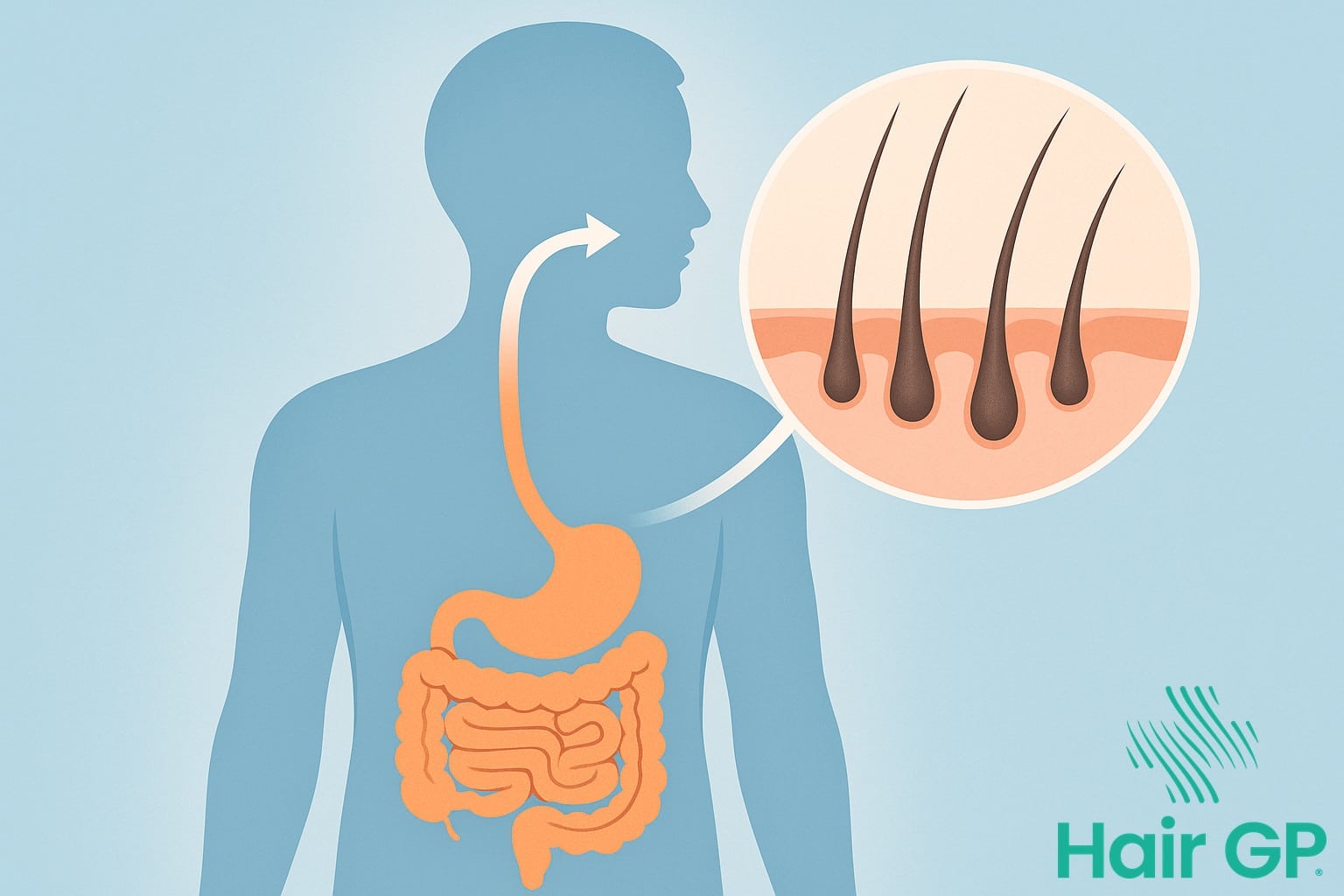
The Science Behind Telogen Effluvium After Acute Illness
Understanding the biological mechanisms behind hair loss following food poisoning requires examining how acute physiological stress disrupts the normal hair growth cycle. This process, called telogen effluvium, occurs when a significant stressor forces actively growing hair follicles to prematurely enter their resting phase, resulting in widespread shedding weeks to months after the triggering event.
Normal Hair Growth Cycle vs. Disrupted Cycle
Under normal circumstances, approximately 85-90% of scalp hair remains in the active growth phase, known as the anagen phase, which typically lasts two to six years[3]. The remaining 10-15% exists in the telogen or resting phase, lasting approximately three months before natural shedding occurs. Each follicle operates independently, ensuring gradual, imperceptible hair renewal.
When severe stress from food poisoning strikes, this delicate balance shifts dramatically. The acute physiological stress pushes up to 30% of hair follicles simultaneously into the telogen phase[4]. This synchronised transition disrupts the normal hair cycle, leading to noticeable shedding approximately two to three months later when these affected hairs shed together. Unlike gradual daily loss of 50-100 hairs, telogen effluvium can cause hundreds of hairs to fall daily, creating visible thinning.
Types of Telogen Effluvium
Telogen effluvium manifests in two distinct forms. Acute telogen effluvium, the type typically associated with food poisoning, results from a single, identifiable stressor and generally resolves within six months as the hair growth cycle normalises. The follicle structure remains intact, allowing full recovery once the triggering stress subsides.
Chronic telogen effluvium, lasting longer than six months, usually stems from persistent underlying conditions rather than isolated events. Food poisoning predominantly causes the acute form, with hair regrowth beginning once the body recovers from the initial insult and follicles resume their normal anagen phase activity.
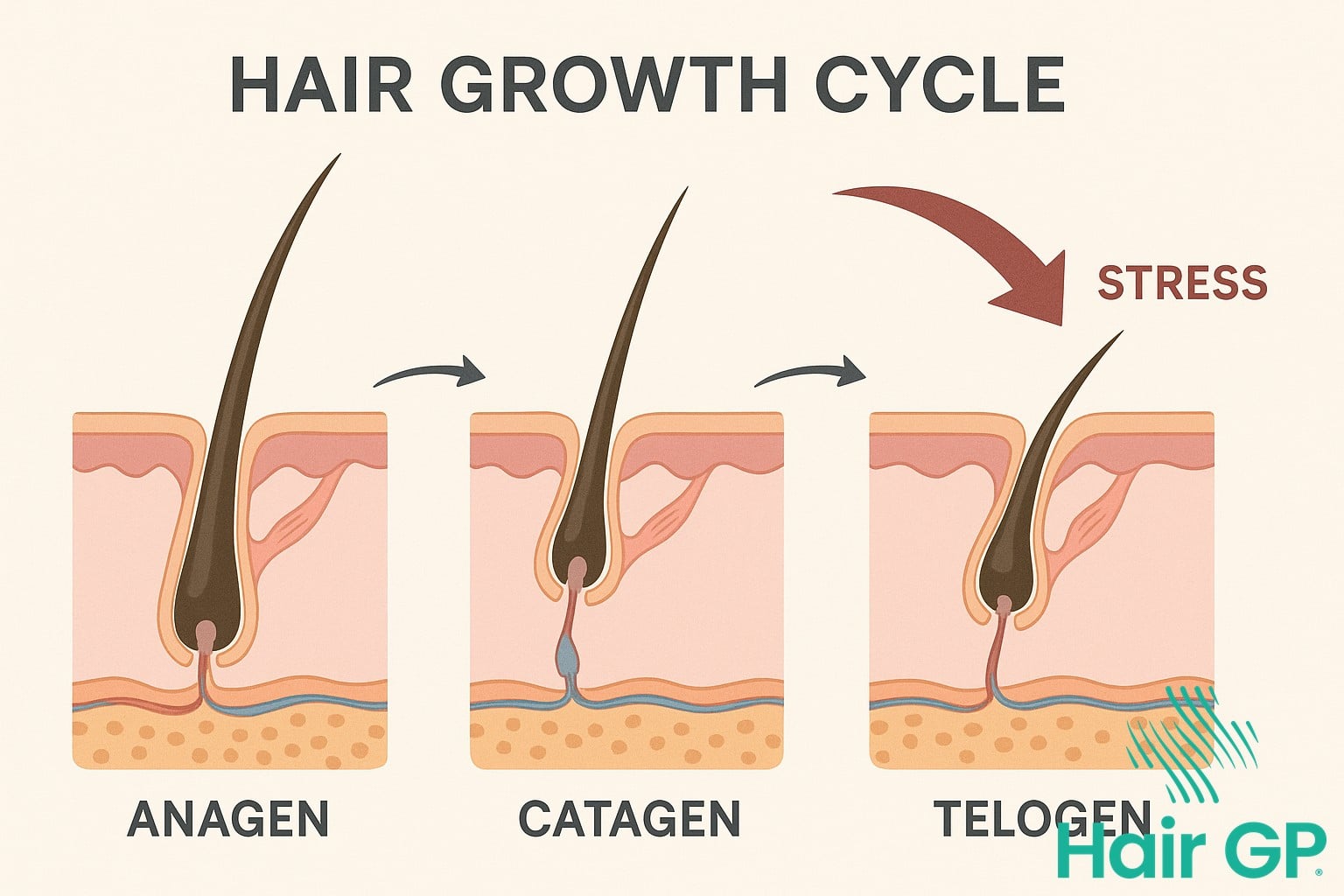
Timeline and Symptoms of Post-Food Poisoning Hair Loss
Understanding the timeline of hair loss after food poisoning can help you recognise whether your symptoms are connected to your recent illness. Typically, increased hair shedding doesn’t begin immediately after recovery. Instead, there’s usually a delay of 6 to 12 weeks between the initial food poisoning episode and the onset of noticeable hair thinning. This lag occurs because hair follicles that enter the shedding phase during your illness take time to release the hair shaft.
The most common sign is finding excessive hair on your hairbrush, in the shower drain, or on your pillow. You might notice your ponytail feels thinner than usual, or you can see more scalp when styling your hair. Unlike patchy hair loss conditions such as alopecia areata, post-food poisoning hair loss typically occurs evenly across the entire scalp. The shedding usually peaks around 2-3 months after the illness and can continue for several weeks before gradually tapering off.
It’s important to note that losing 50-100 hairs daily is normal, but during this type of hair loss, you might shed 200-300 hairs or more each day. The good news is that you won’t go completely bald – this condition affects only a percentage of your hair follicles, leaving the majority intact and continuing their normal growth cycle.
Nutritional Deficiencies and Malabsorption Effects
Severe gastrointestinal distress from food poisoning creates a cascade of nutritional deficiencies that significantly compound hair loss issues. The combination of persistent vomiting, diarrhoea, and compromised digestion prevents proper nutrient absorption, depriving hair follicles of essential building blocks needed for healthy growth. This malabsorption syndrome can persist for weeks after the initial illness, creating lasting effects on hair health.
Key Nutrients Lost During Food Poisoning
Food poisoning episodes result in substantial nutrient losses through multiple mechanisms. Iron deficiency emerges as a primary concern, with studies showing that up to 40% of patients experiencing severe gastrointestinal illness develop iron deficiency anaemia [5]. This occurs through direct blood loss in the intestinal tract and reduced iron absorption capacity. Protein malabsorption represents another critical issue, as damaged intestinal villi cannot effectively process amino acids essential for keratin production. Hair follicles require approximately 5-10 grams of protein daily for optimal function [6]. Additionally, water-soluble B-vitamins, particularly biotin and folate, are rapidly depleted through frequent bowel movements and vomiting episodes.
Impact on Hair Follicle Health
These nutritional deficiencies manifest in multiple ways within the hair structure. Iron deficiency directly correlates with reduced hair shaft diameter, with studies demonstrating a 15-20% decrease in hair thickness when ferritin levels drop below 30 ng/mL [2]. The weakened hair shaft becomes increasingly brittle and prone to breakage. Growth rates slow dramatically, dropping from the normal 0.35mm daily to as low as 0.1mm during severe deficiency states. This combination of structural weakness and slowed growth creates a compounding effect, where existing hair deteriorates whilst new growth remains compromised until nutritional status improves.
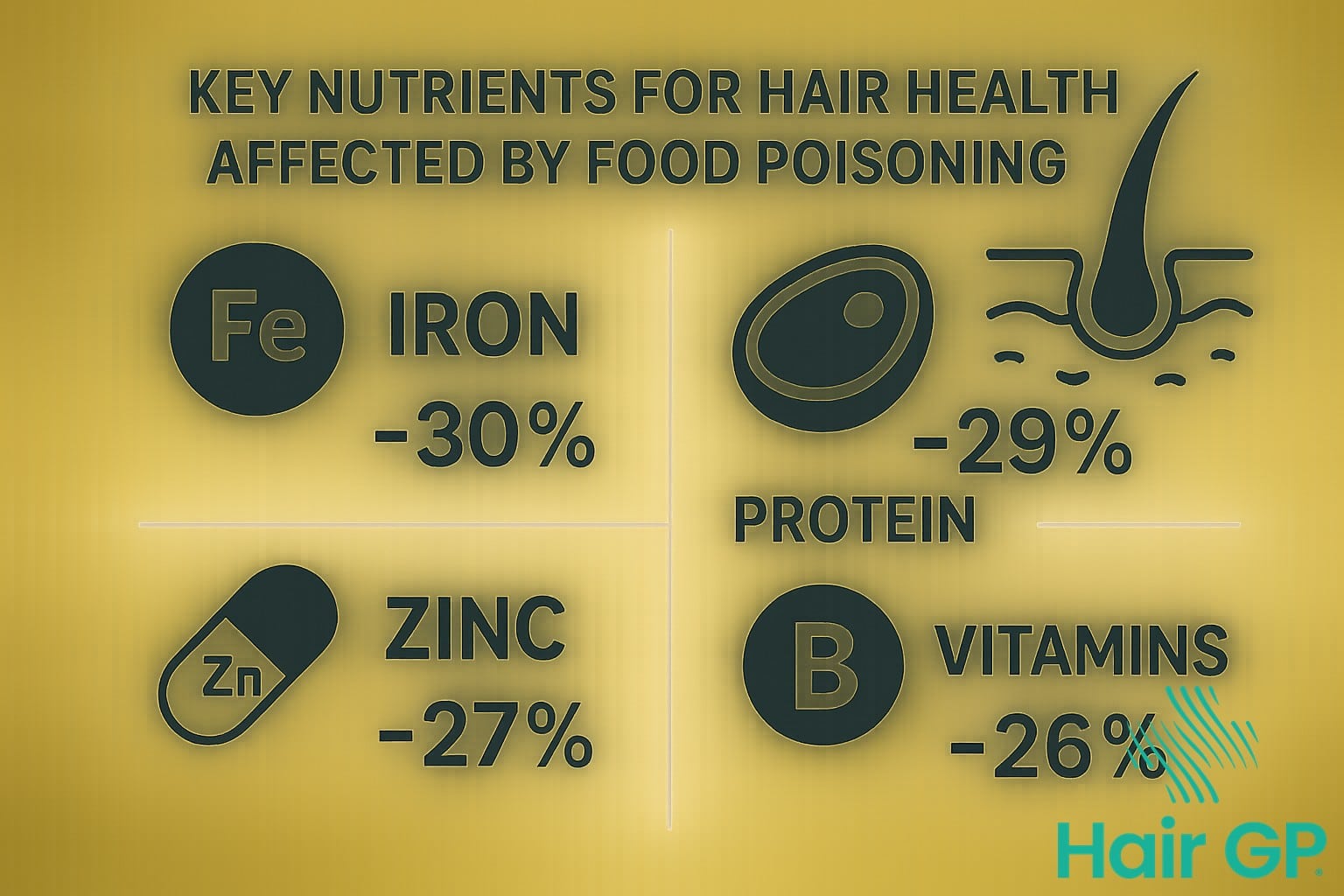
Recovery Strategies and Hair Regrowth Support
Recovering from food poisoning-induced hair loss requires a comprehensive approach that addresses both nutritional deficits and overall scalp health. Since hair regrowth depends on restored nutrient levels, prioritising a balanced diet rich in protein, iron, and B vitamins becomes essential. Focus on incorporating lean proteins, leafy greens, and whole grains to support new hair production. Adequate hydration also plays a crucial role, as proper fluid balance helps deliver nutrients to hair follicles.
Gentle hair care practices can significantly impact recovery outcomes. Switch to mild shampoos that won’t strip natural oils from your scalp. Avoid excessive heat styling and tight hairstyles that could stress fragile regrowth. Massaging the scalp for five minutes daily increases blood circulation, potentially encouraging healthier hair thickness. When washing, use lukewarm water and pat hair dry rather than rubbing vigorously.
Managing stress levels proves equally important, as ongoing anxiety can prolong the shedding phase. Establish regular sleep patterns, aiming for seven to nine hours nightly. Consider relaxation techniques like deep breathing or gentle yoga, which help regulate cortisol levels affecting hair growth cycles.
Most individuals notice initial regrowth within three to six months, appearing as fine, shorter hairs around the hairline. Full hair volume typically returns within six to twelve months, though this timeline varies based on individual health factors. Patience remains key, as pushing too hard with treatments might actually hinder natural recovery. If shedding continues beyond six months or worsens, consulting a healthcare provider ensures no underlying conditions are affecting recovery.

Conclusion
Experiencing hair loss after food poisoning can be distressing, but it’s important to remember that telogen effluvium triggered by acute illness is typically a temporary condition. The physiological stress your body endures during severe gastrointestinal illness can disrupt normal hair growth cycles, leading to noticeable shedding 2-3 months after the initial event.
The key to successful recovery lies in patience and proper care. As your body heals from the acute stress, hair follicles will naturally return to their normal growth phase. Most individuals see significant hair regrowth within 3-6 months, with complete recovery often occurring within a year.
Supporting your hair health during this period involves maintaining a nutrient-rich diet, managing stress levels, and practising gentle hair care. Focus on replenishing essential vitamins and minerals depleted during illness, particularly iron, B-vitamins, and zinc. Avoid harsh chemical treatments and excessive heat styling whilst your hair recovers.
Remember, whilst the shedding phase can feel overwhelming, it’s your body’s natural response to stress. With proper nutrition, adequate rest, and time, your hair will return to its normal growth pattern, often emerging healthier and stronger than before.
Frequently Asked Questions
Hair loss from telogen effluvium usually begins 2-3 months after the stressful event. This delay occurs because affected hairs remain in the follicle during the telogen phase before finally shedding.
Yes, in most cases hair regrows completely within 6-9 months. Once the body recovers from the stress and nutritional deficiencies are addressed, follicles resume their normal growth cycle.
Food poisoning-related hair loss typically presents as diffuse thinning across the entire scalp, occurring 2-3 months after illness. Unlike alopecia areata which causes patchy hair loss, or androgenic alopecia with its distinctive patterns, telogen effluvium affects the whole scalp evenly.
Consult a healthcare provider if hair loss persists beyond 6 months, is accompanied by other symptoms, or if you’re losing hair in patches rather than diffuse thinning. They can rule out other causes and check for nutritional deficiencies.
References
- Harrison S, Sinclair R. Telogen effluvium. Clin Exp Dermatol. 2002. PMID: 12190639
- Malkud S. Telogen Effluvium: A Review. J Clin Diagn Res. 2015. PMID: 26500992
- Mounsey AL, Reed SW. Diagnosing and treating hair loss. Am Fam Physician. 2009. PMID: 19678603
- Asghar F, Shamim N, Farooque U, Sheikh H, Aqeel R. Telogen Effluvium: A Review of the Literature. Cureus. 2020. PMID: 32607303
- Camaschella C. Iron deficiency. Blood. 2019;133(1):30-39. PMID: 25946282
- Guo EL, Katta R. Diet and hair loss: effects of nutrient deficiency and supplement use. Dermatol Pract Concept. 2017. PMID: 28243487

